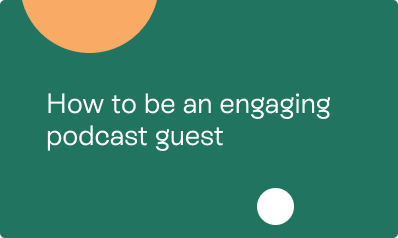
Being invited onto a podcast is a great opportunity to share your ideas with a relevant audience who actually want to listen.
Doing some preparation beforehand will ensure you make the most of the interview. “Preparation” does not mean slavishly following a predefined script – it means setting yourself up to give listeners a great audio experience, and hence more reason to engage with you further.
If you’re reading this in the days (hours!) coming up to your interview, also feel free to share How to be an effective podcast host with your interviewer.
#1 Speak in stories
Humans are hardwired to enjoy stories.
The best stories make people feel like they are part of the action taking place. They become compelled to know what happens next, and end up hanging on your every word.
The simple outline of stories (used by Pixar) is:
- Once upon a time ____________________________. Every day, _______________________. One day ________________________________________. Because of that, _________________________________. Because of that, __________________________________. Until finally, ___________________________________.
In practice, if the host asks something like “What was the moment you knew X was going to succeed?” try and formulate your answer to fit a story outline.
E.g. “Up until this point we’d been struggling to get orders. Every day we’d come to the office and think ‘when is this going to take off – should we just give up?’. Suddenly X came in and said we’d been featured in the New York Times. Within hours, we started getting phone calls from other journalists wanting to write about us. As a result, the website started getting inundated with enquiries and within two weeks we’d sold out of stock. When I had to start apologising to customers that there’d be a delay because we’d sold out already… that’s when I knew we were on to something.”
#2 Prepare anecdotes
Assuming the host shares an outline of what questions will be asked in the interview you can set up three or four good anecdotes to share with the audience.
Even if they don’t, you can think of some anecdotes that convey the message you want to say.
Good anecdotes give people insights beyond what they were expecting. They give rich detail through a relatable example.
For example, if answering the question “What are characteristics you look for when hiring for a new role?” you can expand on “Curiosity” by talking about some of the things a recent hire did so brilliantly, and what impact her work had on you and the team.
Often good anecdotes can be used in response to different questions so having a few good ones in your arsenal means you can use them throughout the interview.
#3 Avoid technical difficulties
It’s basic, but important.
You don’t want to go to all the work of having great things to say and then have listeners tune out because the audio is crappy.
The short version if doing an online interview is:
- Don’t use bluetooth headphones: there ends up being a time lag which distorts the audio. It’s best to have a USB connection, though using headphones with a microphone is also better than speaking directly into your computer
- Be somewhere with good acoustics: avoid sound reverberating around the room that you record in/ lots of background noise. Generally speaking, avoid small rooms with glass walls
You can see the preparation document we send guests here.
Other things to prepare
Beyond these three important aspects there are other smaller tips you can incorporate into your experience being a guest on a show.
Before the interview
- Ask for audience background: it’s helpful to know what type of people listen to the show so you can align your answers in a way that will resonate best. You can also suggest topics to talk about
- Send helpful information: to ensure your “personal brand” is consistent when the show is promoted, send a high resolution image, the best short description of you and URLs for you to be linked to
During the interview
- Speak positively: listeners are drawn to good energy. Even if it feels funny, be expressive with your hands when you speak – it’ll come out in your voice (and on video, assuming it’s a video podcast)
- Speak at a steady pace: being recorded can sometimes be off-putting and lead you to racing through your points meaning people miss the good stuff
- Avoid sounding too scripted: if you drift into “corporate lingo” people will sense it and may start to drift off. Try and remain authentic by giving/ describing your emotions
If you’re doing an online interview, consider putting a post-it note on your screen that says “Breathe and smile :)”.
End of the interview
- Have a strong ending: most hosts will ask something like “Where can more people learn more”. Prepare a clear answer e.g. “To read some articles head to X. It’s best to reach out via Twitter at @X. You can buy my book by searching for X”
After the interview
- Help promote the episode: assuming you liked the interview then you can help more people listening by sharing it with your followers. Whenever I’m a guest, I feel a bit self-conscious about promoting myself so consider framing your messages where the focus is elsewhere e.g. “Thanks @host for a great interview. I enjoyed talking about X, Y, Z. You can listen to the episode (and find other interviews about X) here: [link]”
I hope you found this article useful. If there are any tips you’d like to add please share them in the comments below!